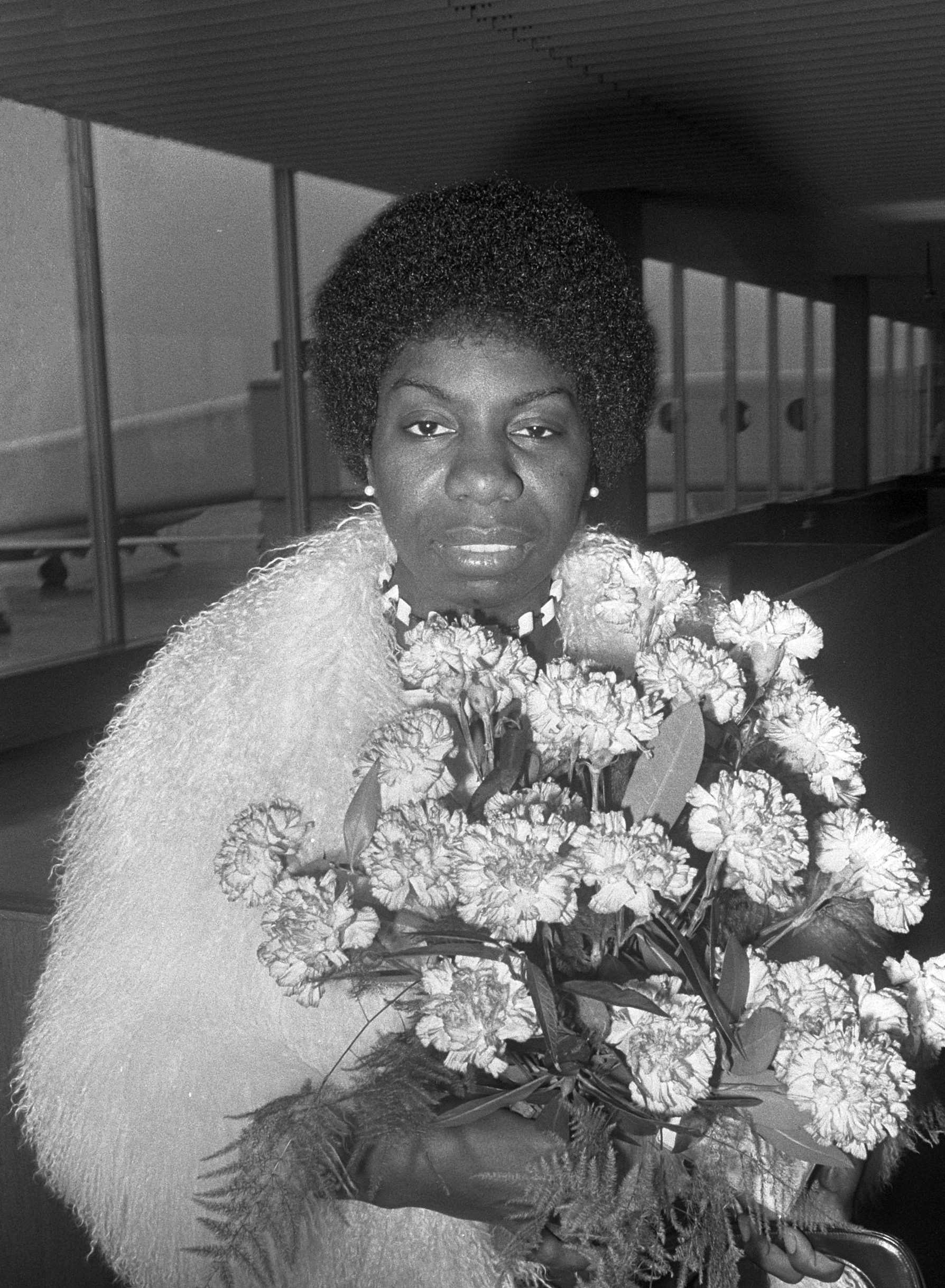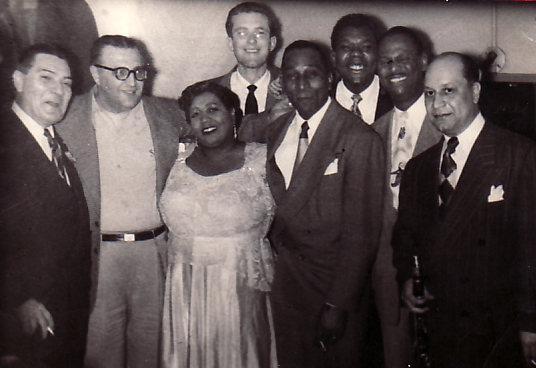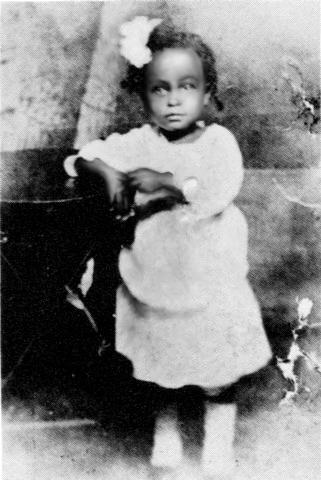|
Wesley Wilson
Wesley Shellie Wilson (October 1, 1893 – October 10, 1958), often credited as Kid Wilson, was an American blues and jazz singer and songwriter. His stagecraft and performances with his wife and musical partner, Coot Grant, were popular with African American audiences in the 1910s, 1920s and early 1930s. His stage names included Kid Wilson, Jenkins, Socks, and Sox (or Socks) Wilson. His musical excursions included participation in the duo of Pigmeat Pete and Catjuice Charlie. His recordings include the songs "Blue Monday on Sugar Hill" and "Rasslin' till the Wagon Comes". Biography Wilson was born and raised in Jacksonville, Florida. He played the piano and organ, and his wife and musical partner, Coot Grant, played the guitar and sang and danced. The duo was variously billed as Grant and Wilson, Kid and Coot, and Hunter and Jenkins, as they appeared and later record with Fletcher Henderson, Mezz Mezzrow, Sidney Bechet, and Louis Armstrong. Their variety was such that ... [...More Info...] [...Related Items...] OR: [Wikipedia] [Google] [Baidu] |
Jacksonville, Florida
Jacksonville is a city located on the Atlantic coast of northeast Florida, the most populous city proper in the state and is the largest city by area in the contiguous United States as of 2020. It is the seat of Duval County, with which the city government consolidated in 1968. Consolidation gave Jacksonville its great size and placed most of its metropolitan population within the city limits. As of 2020, Jacksonville's population is 949,611, making it the 12th most populous city in the U.S., the most populous city in the Southeast, and the most populous city in the South outside of the state of Texas. With a population of 1,733,937, the Jacksonville metropolitan area ranks as Florida's fourth-largest metropolitan region. Jacksonville straddles the St. Johns River in the First Coast region of northeastern Florida, about south of the Georgia state line ( to the urban core/downtown) and north of Miami. The Jacksonville Beaches communities are along the adjacent Atlantic ... [...More Info...] [...Related Items...] OR: [Wikipedia] [Google] [Baidu] |
Butterbeans And Susie
Butterbeans and Susie were an American comedy duo comprising Jodie Edwards (July 19, 1893 – October 28, 1967) and Susie Edwards (née Hawthorne; December 1894 – December 5, 1963). They married in 1917, and performed together until the early 1960s. Their act, a combination of marital quarrels, comic dances, and racy singing, proved popular on the Theatre Owners Booking Association (TOBA) tour. They later moved to vaudeville and appeared for a time with the blackface minstrel troupe the Rabbit's Foot Company.Harris 1994, p. 173. Career Early career and marriage Edwards began his career in 1910 as a singer and dancer. Hawthorne performed in African-American theater. The two met in 1916, when Hawthorne was in the chorus of the show ''Smart Set''. They married onstage the next year. The two began performing as a comic team. They had been touring with the Theatre Owners Booking Association (TOBA) with an African-American husband-and-wife comedy team, Stringbeans and Swee ... [...More Info...] [...Related Items...] OR: [Wikipedia] [Google] [Baidu] |
Abbey Lincoln
Anna Marie Wooldridge (August 6, 1930 – August 14, 2010), known professionally as Abbey Lincoln, was an American jazz vocalist, songwriter, and actress. She was a civil rights activist beginning in the 1960s. Lincoln made a career out of delivering deeply felt presentations of standards as well as writing and singing her own material. Musician Born in Chicago but raised in Calvin Center, Cass County, Michigan, Lincoln was one of many singers influenced by Billie Holiday. Her debut album, ''Abbey Lincoln's Affair – A Story of a Girl in Love'', was followed by a series of albums for Riverside Records. In 1960 she sang on Max Roach's landmark civil rights-themed recording, ''We Insist!'' Lincoln's lyrics were often connected to the civil rights movement in America. After a tour of Africa in the mid-1970s, she adopted the name Aminata Moseka. During the 1980s, Lincoln's creative output was smaller and she released only a few albums. Her song " For All We Know" is featured in ... [...More Info...] [...Related Items...] OR: [Wikipedia] [Google] [Baidu] |
Nina Simone
Eunice Kathleen Waymon (February 21, 1933 – April 21, 2003), known professionally as Nina Simone (), was an American singer, songwriter, pianist, and civil rights activist. Her music spanned styles including classical, folk, gospel, blues, jazz, R&B, and pop. The sixth of eight children born from a poor family in Tryon, North Carolina, Simone initially aspired to be a concert pianist. With the help of a few supporters in her hometown, she enrolled in the Juilliard School of Music in New York City. She then applied for a scholarship to study at the Curtis Institute of Music in Philadelphia, where, despite a well received audition, she was denied admission,Liz Garbus, 2015 documentary film, ''What Happened, Miss Simone?'' which she attributed to racism. In 2003, just days before her death, the Institute awarded her an honorary degree. To make a living, Simone started playing piano at a nightclub in Atlantic City. She changed her name to "Nina Simone" to disguise herself ... [...More Info...] [...Related Items...] OR: [Wikipedia] [Google] [Baidu] |
Valerie Wellington
Valerie Wellington (November 14, 1959 – January 2, 1993) was an American singer who, in her short career, switched from singing opera to singing Chicago blues and electric blues. On her 1984 album, ''Million Dollar Secret'', she worked with Sunnyland Slim, Billy Branch, and Magic Slim. She also worked with Lee "Shot" Williams. Biography She was born Valerie Eileen Hall in Chicago, Illinois. She was trained as an opera singer and graduated from the American Conservatory of Music, but in 1982 she took up singing the blues in Chicago clubs. She also worked in theater, playing roles portraying earlier blues singers, such as Ma Rainey and Bessie Smith. Her opera training enabled her to project her voice to theater audiences. She appeared at the 1984 San Francisco Blues Festival, on a bill with Marcia Ball and Katie Webster. Her recorded work blended a traditional vaudeville approach with a contemporary Chicago blues format. Wellington made few recordings, but her voice was use ... [...More Info...] [...Related Items...] OR: [Wikipedia] [Google] [Baidu] |
Jack Teagarden
Weldon Leo "Jack" Teagarden (August 20, 1905 – January 15, 1964) was an American jazz trombonist and singer. According to critic Scott Yannow of Allmusic, Teagarden was the preeminent American jazz trombone player before the bebop era of the 1940s and "one of the best jazz singers too". Teagarden's early career was as a sideman with the likes of Paul Whiteman and lifelong friend Louis Armstrong. Early life Teagarden was born in Vernon, Texas, United States. His brothers Charlie and Clois "Cub" and his sister Norma also became professional musicians. His father was an amateur brass band trumpeter and started him on baritone horn; by age seven he had switched to trombone. His first public performances were in movie theaters, where he accompanied his mother, a pianist. , Encyclopedia of Jazz Mu ... [...More Info...] [...Related Items...] OR: [Wikipedia] [Google] [Baidu] |
Saffire – The Uppity Blues Women
Saffire – The Uppity Blues Women was a three-woman blues musical ensemble in the Washington, D.C. area. It was founded in 1984 by Ann Rabson, Gaye Adegbalola and Earlene Lewis. Lewis separated from the band in 1992 and was replaced by Andra Faye. The group then featured Rabson on piano, vocals and guitar, Adegbalola on vocals and guitar, and Faye on vocals, bass, mandolin, violin and guitar. Saffire's music was a combination of serious blues songs and comedic novelty songs. They covered original songs (such as "Do Your Duty" by Wesley 'Sox' Wilson, "You Got to Know How" by Sippie Wallace & Jack Viertel, and "Don't You Tell Me"), as well as the music of blueswomen who had inspired them, such as Big Mama Thornton, Ida Cox and Koko Taylor. Their music, both comedic and serious, tends to deal with feminist themes, which has made them popular outside of traditional blues circles. Saffire was the first acoustic band to be signed by Alligator Records. Their song "Middle Aged Blu ... [...More Info...] [...Related Items...] OR: [Wikipedia] [Google] [Baidu] |
Rory Block
Aurora "Rory" Block (born November 6, 1949, in Princeton, New Jersey) is an American blues guitarist and singer, a notable exponent of the country blues style. Career Aurora Block was born in Princeton and grew up in Manhattan. Her father, Allan Block, ran a sandal shop in Greenwich Village in the 1960s, and the Greenwich Village folk music scene, such as Peter Rowan, Maria Muldaur, and John Sebastian influenced Block to study classical guitar. At the age of 14, she met guitarist Stefan Grossman, who introduced her to the music of Mississippi Delta blues guitarists. Block began listening to old albums, transcribing them, and learning to play the songs. At age 15, she left home to seek out the remaining blues giants, such as Mississippi John Hurt, Reverend Gary Davis, and Son House, and hone her craft in the traditional manner of blues musicians; then she traveled to Berkeley, California, where she played in clubs and coffeehouses. After retiring temporarily to raise a family, Bl ... [...More Info...] [...Related Items...] OR: [Wikipedia] [Google] [Baidu] |
Buck Clayton
Wilbur Dorsey "Buck" Clayton (November 12, 1911 – December 8, 1991) was an American jazz trumpeter who was a member of Count Basie's orchestra. His principal influence was Louis Armstrong, first hearing the record "Confessin' That I Love You" as he passed by a shop window. Early years Clayton learned to play the piano from the age of six. His father was an amateur musician associated with the family's local church, who was responsible for teaching his son the scales on a trumpet, which he did not take up until his teens. From the age of 17, Clayton was taught the trumpet by Bob Russell, a member of George E. Lee's band. In his early twenties he was based in California, and was briefly a member of Duke Ellington's Orchestra and worked with other leaders. Clayton was also taught at this time by trumpeter Mutt Carey, who later emerged as a prominent west-coast revivalist in the 1940s. He also met Louis Armstrong while Armstrong was performing at Sebastian's Cotton Club, who taugh ... [...More Info...] [...Related Items...] OR: [Wikipedia] [Google] [Baidu] |
Billie Holiday
Billie Holiday (born Eleanora Fagan; April 7, 1915 – July 17, 1959) was an American jazz and swing music singer. Nicknamed "Lady Day" by her friend and music partner, Lester Young, Holiday had an innovative influence on jazz music and pop singing. Her vocal style, strongly inspired by jazz instrumentalists, pioneered a new way of manipulating phrasing and tempo. She was known for her vocal delivery and improvisational skills. After a turbulent childhood, Holiday began singing in nightclubs in Harlem, where she was heard by producer John Hammond, who liked her voice. She signed a recording contract with Brunswick in 1935. Collaborations with Teddy Wilson produced the hit "What a Little Moonlight Can Do", which became a jazz standard. Throughout the 1930s and 1940s, Holiday had mainstream success on labels such as Columbia and Decca. By the late 1940s, however, she was beset with legal troubles and drug abuse. After a short prison sentence, she performed at a sold-out conce ... [...More Info...] [...Related Items...] OR: [Wikipedia] [Google] [Baidu] |
Carl Weathersby
Carl Weathersby (born Carlton Weathersby; 24 February 1953, in Jackson, Mississippi) is an American electric blues vocalist, guitarist, and songwriter. He has worked with Albert King and Billy Branch, among others. He is now a solo artist. He was nominated for the W. C. Handy Award for Best New Blues Artist in 1997. Biography Weathersby spent his early years in Meadville, Mississippi, a place he still considers home, although when he was aged eight, his family moved to East Chicago, Indiana. Pre-musician years (1953–1979) As a teenager, Weathersby began to learn to play the guitar. One day, after practicing " Cross Cut Saw" many times through, he decided to show his father. After he finished playing it, his father's friend, a man Weathersby knew as Albert, the diesel mechanic, said, "Man, that ain't the way that song goes, that ain't the way I played it." The mechanic turned out to be Albert King, who then showed Weathersby how to play it. Despite Weathersby's mistake, Ki ... [...More Info...] [...Related Items...] OR: [Wikipedia] [Google] [Baidu] |
Louis Jordan
Louis Thomas Jordan (July 8, 1908 – February 4, 1975) was an American saxophonist, multi-instrumentalist, songwriter and bandleader who was popular from the late 1930s to the early 1950s. Known as " the King of the Jukebox", he earned his highest profile towards the end of the swing era. He was inducted into the Rock and Roll Hall of Fame as an "early influence" in 1987. Specializing in the alto sax, Jordan played all forms of the saxophone, as well as piano and clarinet. He also was a talented singer with great comedic flair, and fronted his own band for more than twenty years. He duetted with some of the biggest solo singing stars of his time, including Bing Crosby, Ella Fitzgerald and Louis Armstrong. Jordan was also an actor and a film personality—he appeared in dozens of "soundies" (promotional film clips) He also made numerous cameos in mainstream features and short films, and starred in two musical feature films: Swing Parade of 1946, probably targeting white viewers ... [...More Info...] [...Related Items...] OR: [Wikipedia] [Google] [Baidu] |



.jpg)